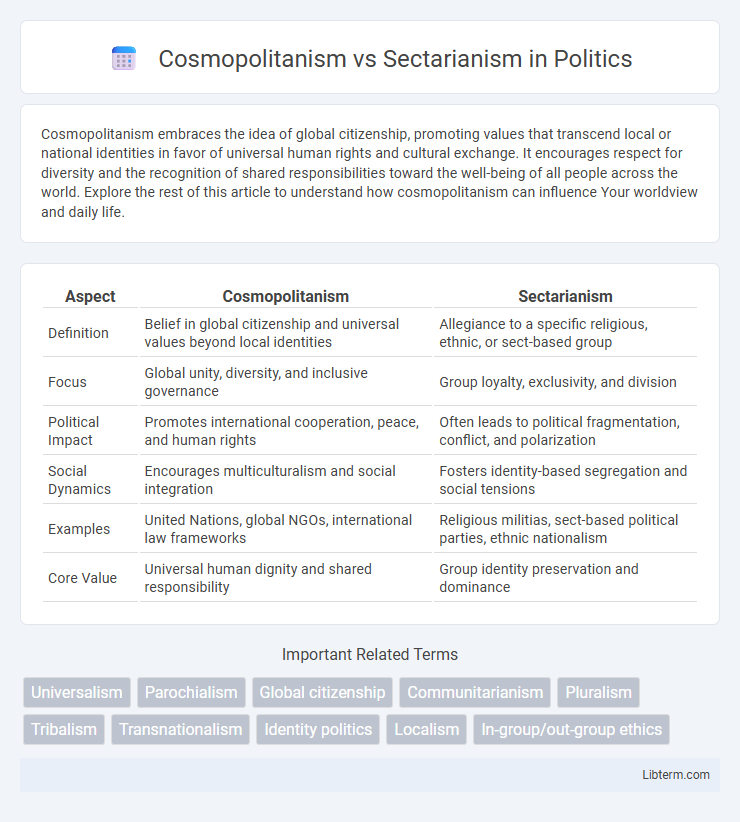Cosmopolitanism embraces the idea of global citizenship, promoting values that transcend local or national identities in favor of universal human rights and cultural exchange. It encourages respect for diversity and the recognition of shared responsibilities toward the well-being of all people across the world. Explore the rest of this article to understand how cosmopolitanism can influence Your worldview and daily life.
Table of Comparison
| Aspect | Cosmopolitanism | Sectarianism |
|---|---|---|
| Definition | Belief in global citizenship and universal values beyond local identities | Allegiance to a specific religious, ethnic, or sect-based group |
| Focus | Global unity, diversity, and inclusive governance | Group loyalty, exclusivity, and division |
| Political Impact | Promotes international cooperation, peace, and human rights | Often leads to political fragmentation, conflict, and polarization |
| Social Dynamics | Encourages multiculturalism and social integration | Fosters identity-based segregation and social tensions |
| Examples | United Nations, global NGOs, international law frameworks | Religious militias, sect-based political parties, ethnic nationalism |
| Core Value | Universal human dignity and shared responsibility | Group identity preservation and dominance |
Defining Cosmopolitanism and Sectarianism
Cosmopolitanism emphasizes global citizenship, embracing cultural diversity, and promoting universal moral values that transcend national or sectarian identities. Sectarianism centers on strong loyalty to a specific religious, ethnic, or political group, often leading to exclusion or conflict with other communities. The contrast lies in cosmopolitanism's inclusive, boundary-crossing ethos versus sectarianism's exclusive, identity-based allegiance.
Historical Roots of Both Ideologies
Cosmopolitanism traces its historical roots to ancient Stoicism, emphasizing universal belonging and shared human values beyond local identities, as seen in the teachings of Cynics and Enlightenment philosophers who promoted global citizenship. Sectarianism, by contrast, originates from deeply ingrained tribal and religious divisions, often reinforced through historical conflicts and power struggles that prioritized narrow group identities over broader unity. These opposing ideologies shape modern political and social landscapes by influencing concepts of inclusion, nationalism, and global cooperation.
Core Principles: Inclusivity vs Exclusivity
Cosmopolitanism advocates for inclusivity by promoting universal human rights, cultural diversity, and global citizenship, emphasizing the interconnectedness of all people regardless of nationality or ethnicity. Sectarianism, rooted in exclusivity, prioritizes loyalty to a specific group, often leading to division based on religion, ethnicity, or political allegiance, and fosters in-group favoritism while marginalizing outsiders. The core tension between these principles shapes social cohesion, conflict dynamics, and policy approaches toward multiculturalism and national identity.
Impact on Globalization and Society
Cosmopolitanism promotes inclusive global citizenship and cultural exchange, fostering cooperation and social cohesion across national borders, which accelerates globalization and reduces conflicts rooted in identity. Sectarianism, by emphasizing exclusive group identities and often fostering distrust or hostility toward outsiders, can fragment societies and impede international collaboration, creating barriers to global integration. The tension between these ideologies significantly shapes political dynamics, migration patterns, and the development of transnational institutions in contemporary global society.
Cultural Exchange vs Cultural Isolation
Cultural exchange fosters cosmopolitanism by promoting understanding, diversity, and the blending of traditions, which enriches societies and drives global cooperation. Sectarianism thrives on cultural isolation, reinforcing divisions and limiting exposure to differing perspectives, which can lead to prejudice and conflict. Societies embracing open cultural interaction tend to experience greater innovation, social cohesion, and economic growth compared to those adhering to insular, sectarian frameworks.
Cosmopolitan Citizenship in a Globalized World
Cosmopolitan citizenship emphasizes the idea that individuals possess rights and responsibilities that transcend national borders, fostering global justice and cooperation in an interconnected world. This approach promotes cultural diversity, mutual respect, and shared human values, challenging sectarian divisions rooted in ethnicity, religion, or nationality. In a globalized era, cosmopolitanism supports inclusive policies and global governance structures that address transnational issues such as climate change, migration, and human rights.
Sectarianism and Social Fragmentation
Sectarianism fosters social fragmentation by promoting exclusive group identities based on ethnicity, religion, or ideology, undermining social cohesion. This division often results in intergroup conflict, weakened trust among communities, and challenges in governance due to competing loyalties. Persistent sectarian allegiances can erode national unity and hinder inclusive policy-making aimed at social integration.
Political Implications and Policy Differences
Cosmopolitanism promotes inclusive global governance and policies that support multiculturalism, human rights, and international cooperation, emphasizing universal values and cross-border solidarity. Sectarianism prioritizes allegiance to specific ethnic, religious, or cultural groups, resulting in policies that reinforce group identity, often at the expense of national cohesion and minority rights, leading to exclusionary practices. These divergent political frameworks shape policy decisions on immigration, social integration, and conflict resolution, impacting national stability and international relations.
Challenges and Criticisms of Each Approach
Cosmopolitanism faces challenges related to perceived erosion of local identities and cultural homogenization, which critics argue can undermine community cohesion and national sovereignty. Sectarianism encounters criticism for fostering division, exclusion, and conflict by prioritizing narrow group loyalty over broader social unity, often leading to political instability and social fragmentation. Both approaches struggle to balance diversity and inclusion, with cosmopolitanism criticized for idealism and sectarianism condemned for perpetuating intolerance.
The Future: Bridging Cosmopolitanism and Sectarianism
Bridging cosmopolitanism and sectarianism requires fostering inclusive dialogue that values diverse identities while promoting shared human values, enabling societies to transcend polarizing divisions. Emphasizing education, cross-cultural exchange, and policy frameworks that protect minority rights can create resilient communities capable of harmonizing global interconnectedness with local traditions. Innovative governance models integrating cosmopolitan principles with sectarian realities hold potential to shape sustainable and peaceful futures.
Cosmopolitanism Infographic

 libterm.com
libterm.com